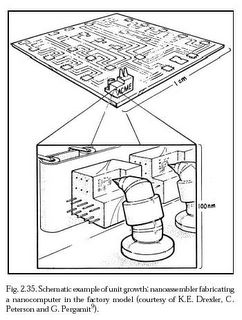Using custom manufacturing a Wired journalist with no design experience designed his own an electric guitar in eMachineShop and had the parts printed to spec.
Gershenfeld, director of MIT's Center for Bits and Atoms, makes a reasonably good case that soon every house will have its own personal fabricator. He has already taken an important step - he has shrunk the personal fabricator down to a single room's worth of off-the-shelf tools, all of which are available right now.

Custom manufacturing in a fabrication lab -
The CBA fabrication labs are already used to produce peculiar one-off individualised devices, such as GPS-enabled tags for sheeps, electrode-driven device to measure the fat content of milk, motion-detector security system to protect a personal diary.
Current precision of cutting (Epilog Legend 24TT) and milling (MDX-20) tools is about 25-50 microns.
Further path:
- miniaturise all components of a personal fabricator
- combine it all together into a set of compatible devices
- add some robotics so that manual labour is not needed for assembly
- make it use cheap standard raw materials and parts
- simplify, make more user-friendly, interface with an online library of designs
OK, that doesn't actually sound too far-fetched, but would quickly make the fabricators ubiquitous and extremely useful.
Next steps:
- continue the minaturisation
- replace the components one by one with nanotechnology based machines
- optimise the design of a fabricator to make sure no space/matter is wasted

Tabletop nanofactory
Now you have a nanofactory (vision, 60Mb video). This is already functional nanotechnology and will set off the final stage of the revolution (super-exponential computing power growth and the singularity).
Further steps:
- break down the nanofactory from a single machine into small parallelised units, each capable of producing small nano-objects to spec
- make the units as small as possible
Finally, we have a nanoassembler.

Nanoassembler
Final step:
- make it possible for this assmbler to make copies of itself
We have a unversal self-reproducing nanoassembler. Finally an end to material scarcity. This would signify final liberation of the man and the control of mind over matter. This is a posthuman level, where turning all dumb matter into smart matter is finally possible.

Nanoassembler making nanocomputers in a nanofactory
Edit this text at Future wiki





